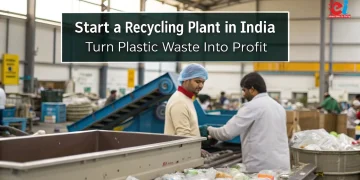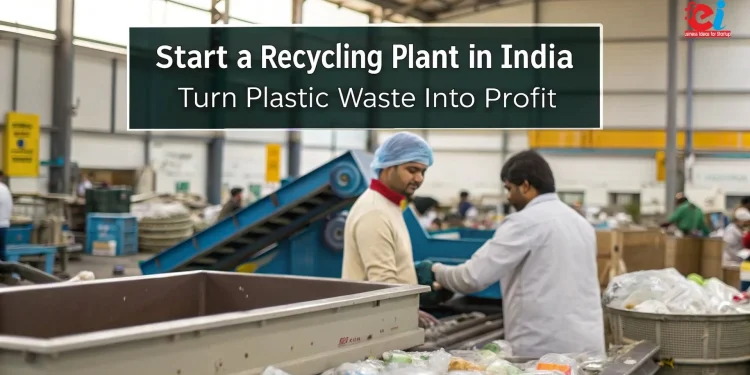Once celebrated for its versatility, plastic now stands as one of the most severe issues concerning the environment and ecology in its contemporary sense. From packaging and consumer goods to construction and even agriculture, plastics are omnipresent. However, everything has a dark side, and so does plastic consumption, with its afterlife. India alone produces more than 3.5 million tonnes of plastic waste each year.
Out of all the waste produced, only 60% gets recycled, and most of it goes through the “informal” sector. Evolving business burdens of the environment give rise to systematic, effective, and scalable solutions. This is where the plastic waste recycling units come into play – a new turning point in the context of business-plastic waste recycling plants that combine high convenience and purpose.
Opening up a plastic recycling unit is much more than a vertical expansion of a firm’s manufacturing capabilities; it could be viewed as embracing a circular economy. With the right strategy, capable machinery, and regulatory compliance, business owners can make value-sourced materials out of discarded plastics that cut across several industries. The following is a detailed guide aimed at motivating business owners and stakeholders motivated to launch a plastic waste recycling plant in India, outlining market opportunities and process flows, necessary tools of business, licensing, and viability balancing.
Recycling and India’s Plastic Waste Problem
The growth in the use and consumption of plastic is especially high in metropolitan cities which leads to extreme plastic waste. Single-use plastics, PET bottles, multilayer packaging, and broken plastics are a large portion of municipal solid waste. Due to lack of segregation, single-use plastics tend to block the drains, streets, and are often burnt which pollutes the air.
Repeating these actions leads to the production of ‘thermoplastics’. PET (Polyethylene Terephthalate), HDPE (High-Density Polyethylene), LDPE (Low-Density Polyethylene), and certain forms of polypropylene waste are extremely easy to recycle. If managed properly, these forms of plastics possess huge potential for businesses to be set up, especially with the use of India’s improving economic framework along with an industrial base eager for affordable raw materials.
Having EPR (Extended Producer Responsibility), banning the doing any actions involving single-use plastics, along with the updated Plastic Waste Management Rules (2016) is helping on the matter. Because of these policies, manufacturers are forced to work with recyclers for sustainable options and clean up their reputations. With these steps, there is a convincing changing perception among consumers and formal businesses from the organized business that purchases used materials will gain great profit.
Establishing the Base for a Plastic Waste Recycling Plant
The initial step in setting up a recycling facility is choosing the ideal location. The site must be situated within reach of electricity and water supply, as well as in close proximity to transport networks, making industrial zones ideal. It is also beneficial if the location is close to metropolitan areas or commercial hubs, as these regions provide a steady supply of recyclable plastic waste granules.
The average square footage needed for a moderately sized recycling plant ranges from 5,000 to 10,000 square feet. It also needs to incorporate appropriate machinery, administrative offices, storage for incoming waste and finished products, and expansion space. Additionally, the design must prioritize an efficient recycling workflow to minimize handling time, flow disruption, and contamination risk.
After closing on the land, attention can be directed towards the building of infrastructure and obtaining the relevant permits. These permits include registration with the MSME (Udyam) portal, environmental clearance from the State Pollution Control Board, GST registration, and a factory license. Those who deal with large quantities of plastic waste, or have collaborated with FMCG brands under EPR contractual terms, might require additional permits from the Central Pollution Control Board (CPCB) as well as documentation for traceable custody.
Types of Plastics and Their Recycling Potential
The next task is to determine what types of plastic the plant will work with. This may be influenced by the local waste supply, the demand for the product, and the available machinery. Bottled water contains PET which can be recycled into polyester fiber, clothing, and other containers. HDPE is used for milk jugs and shampoo bottles. It can be recycled into piping, crates, and even toys. LDPE is plentiful in plastic bags and films and is turned into bin liners and flexible tubing. PP is available in containers, caps, and automotive parts and can be recycled to make battery casings and fibers.
There are several options for recycling mixed plastics, however, the sorting and preprocessing systems for this stream tend to be more complicated. Selecting one specific plastic stream helps to set up procedures, improves standardization, ensures attention to quality, provides easier compliance, and probably the best, reduces complexities in the start-up stage.
Related: List of Profitable Business Ideas in Waste Management Disposal and Recycling Industry
Finding Waste Plastic: Developing the Supply Chain
It is essential for a plastic recycling plant to operate optimally, that it has a reliable stream of waste plastic that is readily available and abundant. This feedstock can be derived from various municipal arrangements, local scavenger networks, bulk waste suppliers like shopping malls, hospitals, hotels, and even dealers in plastic scraps. Collaborating with kabadiwalas and scrap dealers helps maintain a reliable supply of waste, and new information technologies make bulk buying from numerous suppliers simpler.
Separation is the most noteworthy step in maintaining the desired quality for further processing. Lack of segregation or mixed plastic will result in substandard granules, constant equipment failures, and reduced output. Therefore, having a basic selection strategy at the plant or collaborating with suppliers who provide pre-sorted materials improves value significantly.
Recycling Equipment and Procedures
Upon receipt of raw plastic materials, the recycling procedure commences at the facility. The process begins with a shredder or plastic crusher—the first machine in the chain, which decimates big items of plastic into smaller flakes or pieces. The resulting fragments undergo washing, both hot and cold, as well as the use of detergent or caustic soda to eliminate dirt, grease, and stubborn labels. Further scrubbing through a friction washer follows, after which the material transfers to the drying unit.
Depending on the type of plastic to be recycled, the agglomerated or the granulated type is used. The extruder is charged with melting plastic flakes or agglomerated material. Thin strands of plastic are extruded through the die and cooled in a water bath. Pellets or granules are then cut with a pelletizer and are ready to be used as recycled raw materials for manufacture.
Some factories, depending on the waste quality and output requirements, also incorporate color masterbatch feeders, vacuum degassing units, and screen changers to improve consistency, sustainability, and even color quality of the recycled plastic.
Promoting Recycled Plastics and Market Expansion
The end result—plastic granules—has a wide variety of uses. Recycled PET is sold to textile industries for production of polyester yarn while granules HDPE and LDPE are used by blow molding and injection molding manufacturers for household goods, industrial packaging, and agricultural tools.
A B2B clientele can be developed through online resources such as IndiaMART and TradeIndia by attending trade expos or offering contract manufacturing under EPR partnerships which can ensure there’s demand throughout the year. Some recyclers also manufacture private label products including garbage bags, containers, or sheets propelling them into the B2C market.
There is increasing demand in Europe and Southeast Asia for clean PET flakes. Hence, the potential for exporting recycled plastic is rising. For these markets, meeting export standards, REACH, and RoHS policies are essential.
Sustainability, Safety, and Regulatory Compliance
Operating a plastic waste recycling plant comes with regulatory responsibilities. It’s important to have a well-functioning Effluent Treatment Plant (ETP) to manage wastewater from washing units. Air pollution control measures, such as exhaust fans, chimneys, and filters for fumes from extrusion, ensure safe operations and environmental compliance.
Worker safety is paramount. Operators should be provided with personal protective equipment (PPE), regular health check-ups, and training on handling machines and chemicals. Fire safety equipment and emergency exits must be in place, and records of waste, process parameters, and output must be maintained for audit purposes.
Related: Investment Opportunities in Plastic Waste Recycling
Conclusion: Turning Waste into Opportunity
India’s mounting plastic waste problem is a looming challenge—but it also presents a powerful entrepreneurial opportunity. By launching a plastic waste recycling plant, you’re not just building a business—you’re contributing to cleaner cities, greener industries, and a more sustainable economy.
The key lies in selecting the right process, investing in quality machinery, ensuring reliable sourcing, and maintaining high product standards. With the government actively promoting recycling through regulatory frameworks and financial incentives, now is the ideal time to step into the business of plastic recovery and repurposing.Niir Project Consultancy Services (NPCS) offers turnkey project support, DPRs, machinery selection, financial modeling, and regulatory assistance for entrepreneurs in the plastic recycling sector.


















